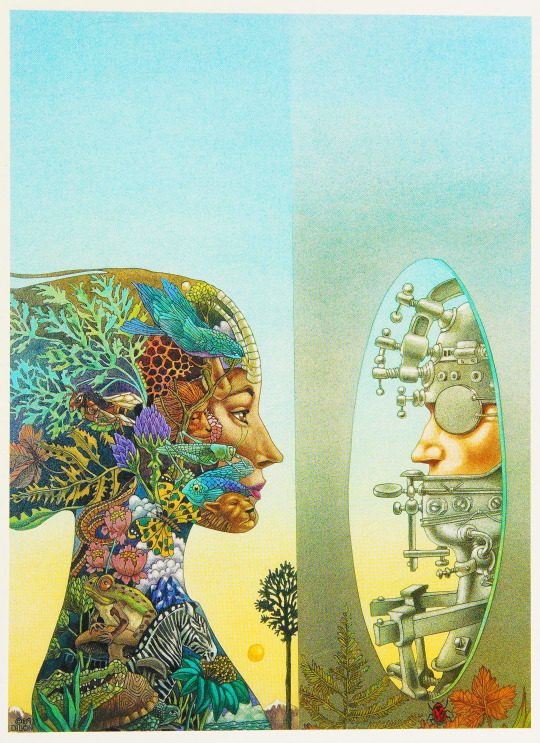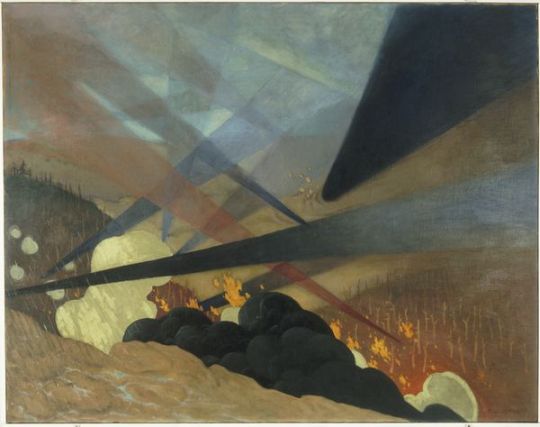#Social criticism
Explore tagged Tumblr posts
Text

The hardest thing is to escape from a cage you can't see
108 notes
·
View notes
Text

Diane Dillon (1933-) & Leo Dillon (1933-2012), 'Coming To Our Senses', 1989 Cover to the book by Morris Berman that I discovered at the tender age of 17. The basic thrust concerns the subject of embodiment and how Western culture drifted into abstraction/rationalism and away from the sensuous, somatic dimension of our existence as organic beings in a world. (What I've just written is a bad synopsis given that it's been years since I've read the book but it's not entirely off the mark.) All I can tell you (dear reader) is that it helped steer me into the direction I took when I delved into the fields of philosophy and economics only to encounter a great deal of said "abstraction" and "rationalism", framing people not as embodied beings with sometimes conflicting urges and impulses but as detached, rational self-maximizers who coldly calculate each action with a strict cost-benefit measurement (you may think this is more economics than philosophy but you'd be surprised how much of philosophy carries this bias almost as an axiom). [Note: this was before "behavioral economics" really became a more ubiquitous approach in economic theory but I digress] I can say that I plan a re-read to see how the book holds up but I think I can safely suggest that you give it a read (<---that is a terribly constructed sentence). This book led me to several other books by Berman, the main two being his earlier book, The Re-enchantment of the World (which I also remember loving) and his later work (from 2000) The Wandering God: A Study in Nomadic Spirituality Morris, at least from the above books, is an eclectic scholar who meanders around topics finding their connections in interesting ways and his work did wonders for my curious young mind. His later books, like The Twilight of American Culture and Dark Ages America, while interesting in their analysis of America as a nation in late stage capitalism, didn't resonate with me like his earlier work did. Again, I have not read either of the above books since they were published so it might be worth re-visiting them too just to see what Berman got right and wrong about where the United States was headed.
#Diane Dillon#Leo Dillon#american artists#book covers#coming to our senses#Morris Berman#social criticism#color illustration
77 notes
·
View notes
Text
Y'all be like: "I don't need to add spoiler warnings for things that just came out" and far worse "I don't need to add content warnings for inherently trauma-related things and inherent potential triggers!"
You people hate human decency so fucking bad.
#social commentary#my commentary#fandom criticism#social criticism#fandom critical#social critique#vent#rant#social media
24 notes
·
View notes
Text
There's something about RPF that really irks me. I know that people get attached to real people and all, but a lot of the time it goes too far. These are not characters for you to play around with. These are real, living people with lives of their own. They are not toys for you to play with just because they seem so far from where you stand.
I get it. People have fantasies. People have celebrity crushes. But you cannot headcanon REAL PEOPLE. These ideas will bleed into the public perception of them.
This happened with Septiplier. This happened with Dan/Phil. THIS HAPPENS TO SERIAL KILLERS. And my particular point of interest today is Luigi Mangione. Yes, I know, I've made a post or two about him before, but the way that the internet has treated him is atrocious.
This is a real-ass person who is on trial and facing the death sentence. And people are writing smutty self-insert fanfiction about him. They are sexualizing a man that they have never met and really don't know much about. We are so focused on how attractive he looks that we are COMPLETELY missing the bigger picture. This is a man who is being charged with crimes against one man. And the murder of this one man is being called an act of terrorism and Mangione is potentially going to die for this.
We are missing the fact that one rich, powerful man's death is worth more than countless students, teachers, queer people, trans people, and many other communities because of the way that they have shaped this system. Cruelty is allowed, but not when it's one of them.
Remember that Luigi Mangione is a person. He is a living human being who is facing consequences for a crime that he may have not committed. And yet he is facing death for it. Don't let that fade away.
#anarchism#anarchist#anarcho communism#anarchocommunism#anarchopunk#social commentary#luigi mangione#societyandculture#rpf critical#RPF critique#social criticism#social critique
36 notes
·
View notes
Text
Nice argument! Unfortunately, I have armchair-diagnosed you with a personality disorder that makes everything you just said a twisted over-exaggeration of what actually happened to bolster your ego and make yourself the victim. Get help
#for clarity this is mocking this type of shut-down#nice argument#nice argument unfortunately#mental health stigma#npd stigma#victim blaming#social criticism#social commentary#very frustrated with certain people rn#i don't even have npd but i can't even imagine how awful this shutdown is for people who actually do
13 notes
·
View notes
Text

Juan O'Gorman (1905-1982), ‘Nuestra Maravillosa Civilización’, 1976.
10 notes
·
View notes
Text

One more Orwell with one more social criticism. And one more of my alt-covers. Love this book! All book characters are in a pretty dire situation, but they don't get discouraged and somehow overcome challenges and hardships. I found that very encouraging.
Made using composite image techniques with 4 images. I couldn't help but put bedbugs on the cover as companions of the cheapest room, hope all of you are okay with insect pictures.
Thanks for watching!
#book cover#book cover design#book design#fiction#fiction books#book covers#booklr#george orwell#orwellian#orwell 1984#photomanipulation#image manipulation#photo compilation#vintage books#classic books#social criticism
9 notes
·
View notes
Photo

Otto Ritschl, Der Betrunkene, 1924. Oil on canvas, 76 x 98 cm.
#Otto Ritschl#neue sachlichkeit#new objectivity#social criticism#magic realism#modern art#Weimar Republic#Babylon Berlin#modern painting#modernism#oil painting#1920s#1924#post-expressionism#1920s painting#realism#realism after modernism
74 notes
·
View notes
Note
Is feeling down because others seem to be simply minded-ly following propoganda and spouting cliches, childish? Or is not caring about it and feeling numb to it just cynicism and "giving up"?
More broadly, the question of "caring" - it probably is true that this is just sentimentality and self inflicted neuroticism, self love in the mask of victim hood - yet idk, it just seems to be a natural reaction to cry for the world even if that makes you look like a gay lil dweeb lol
There's no conversation you're ever going to have with an individual or small group overwhelming enough to convert them to a whole new way of thinking, even if one trusted oneself enough to assign oneself this task. It doesn't really matter what anyone believes, therefore, in day-to-day interactions. I usually just change the subject. Or I neutrally probe their views further, sometimes pretending sympathetic curiosity, to see exactly what propaganda they've been imbibing. (Then again, what propaganda have I been imbibing? We have to remember to ask ourselves this question, too.) People's opinions change when climates of feeling change. If you can affect those, go for it; if not, stick with "it doesn't matter."
4 notes
·
View notes
Text
finished Rouge by Mona Awad, the Absurdity of it all really made me question if this book could make me emotional but my good it did, she literally never misses!♡
#aa#girlblogging#selfcare#self love#aesthetic#reader#bookish#reading motivation#literature#mona awad#rouge#social criticism
7 notes
·
View notes
Photo

Félix Vallotton, Verdun. Interpretation of a war painting, black, blue and red projections, ravaged land, gas clouds.
“The painter makes no attempt to convey the decisive instants of the battle, but provides an image to sum up the war, where all human presence has disappeared.” - Musée de l’Armée
67 notes
·
View notes
Text
Labels
"We should stop making billionaire characters heroes because some of real billionaires are assholes".
"We need to stop making any German characters good guys in 1940s because some of the Germans were Nazis".
"We should stop showing NPD characters with any positive traits because some of them are evil manipulators".
"We should stop casting black actors in films about medieval Europe because most of the people there were white".
"We should stop making female characters strong because some real women are physically weaker than men".
"We should stop this transgender lunacy because most people are cisgender".
Oops...
#mcu fandom#labelism#first cast out the beam out of thine own eye#not sure who is a real asshole here#but not tony stark#tony stark#social criticism
12 notes
·
View notes
Text
I love that we've gotten through a grand total of two weeks of 2025 and things have already gone sideways in the US. Something about everything that that man says is so exhausting to hear. The absolutely ridiculous things that he spouts astound me. I genuinely don't know if he's doing it on purpose or not, but I'm almost inclined to think that he does.
There's a thing that cult leaders do where they put themselves in the position of the prosecuted. They victimize themselves to appear like an underdog or revolutionary to their followers. "If they think that I'm stupid, they think YOU'RE stupid. But I think that you're smart. I understand you like they don't." It's pitching the narrative of "Us Vs. Them" and it helps with control.
It also serves the secondary purpose of throwing a flashbang into the argument. If we're more focused on the ridiculous things that he's saying, we're more likely to overlook the things that are happening behind the scenes. If we're focused on the confetti thrown in our face, we're less likely to see the birthday candles burning up the presents. It's important to overlook the things that he says. Treat him like a toddler throwing a tantrum and look around at what's actually happening instead of focusing on the shouting.
Take your time to take a jab or two if you want, but don't stop to look at the smoke and mirrors. Take a look at what it might be hiding. You might find more than you thought you did at first glance.
#my commentary#social critique#united states#united states politics#us politics#fuck trump#trump /derogatory#social criticism#trump critical#social commentary#social awareness#political#politics#2025
18 notes
·
View notes
Note
Is it me or have people become super sensitive and intolerant ever since we got the Internet? From my experience, if you ever suggest someone needs to loose weight because you're just worried about their health (even in private), they'd think you're fatphobic or at least in other cultures. If you happen to criticize a culture or religion that's proven to be toxic, it's immediately dismissed as racist or anti-religion.
Even those with mental health issues and disabilities like autism often get demonized like dude! How is the kid acknowledging they messed up and explaining why they said or did something is justifying behavior? Aren't we supposed to understand them?
There seems to be no nuance. No room to talk things out, reflect and getting to know where the other is coming from. People are already right at your throat. The reason I don't tell my parents about a lot of my problems and misunderstandings I've had with strangers is they'd just tell me "Maybe you did something wrong!" or "That's what you getting involved in drama." I hate how we have to walk on eggshells and be all "feelings over facts."
I agree with the assessment that people lack nuance, but I don't think that necessarily has anything to do with "Internet". I think it's far more to do with the state of capitalism we are currently in.
I was talking to my spouse over dinner just before this ask hit my inbox where I was talking to her about the Red Book situation. And while I'm not very optimistic due to the censorship benefitting both China and US governments, I think there is still good to come from this experience. Even if it doesn't last.
We think the internet is so large, but for as large as it is, it is still a very small portion of what exists on the web. It's gotten a bit harder over the years to get into other internet pockets, but I taught myself to read Russian in high school to find more information on historical events and interpretations. I didn't trust the US education system and would read first hand news articles from the era of the Cold War and WWII in Russia and the US to cross reference the information. I figured whatever both stayed happened must be true while the more emotionally charged statements and word selections were the narratives that were seen as most favorable.
It's not the introduction of the internet removing nuance, but rather the younger demographics infiltrating these spaces. Starting so young on social media, replacing human interactions, it is removing the concept of Dialectics.
Two things can be true at once. And it's important to recognize that just because someone doesn't adhere to your sensibilities doesn't make them "bad' or "wrong". Like the Russian HB fan who was dragged over twitter for having used the word "incomplete" about Fizzarolli being an amputee was an overblown response. It was most likely due to a wonky translation, but also their art was never endorsing what Stolas was saying. It was supposed to be a mean comment to show how people were comparing Stolitz and Fizzmodeus. It wasn't supposed to be a kind comment, it also doesn't necessarily reflect the artist's opinions on people with amputations. But people made it so.
It's not about the internet. It's about a lack of experience with someone that doesn't look or act like you. We get so obsessed with Right and Wrong, that we can't see things just as they are. It's this need to be valued based on how "right" you are. Right is good and to be a good person, I need to always be right. But also lacking perspective of just how small their view actually is.
Existentialism is a good time to remember that the whole rest of the universe doesn't care what you think or do or believe. All that matters is you. But no man is an island, even the planets need each other to maintain their orbits. So it's best to start learning how to exist with people who aren't you.
And we've forgotten that other humans are not a part of us.
6 notes
·
View notes
Text
"I criticize elites a lot. But I have nothing against "elites" as a category. I'm not a communist (though even communist regimes had elites; funny how that works).
𝐌𝐲 𝐜𝐫𝐢𝐭𝐢𝐪𝐮𝐞𝐬, 𝐭𝐡𝐨𝐮𝐠𝐡, 𝐚𝐫𝐞 𝐚𝐢𝐦𝐞𝐝 𝐚𝐭 𝐭𝐡𝐞 𝐦𝐨𝐫𝐨𝐧𝐢𝐜 𝐦𝐞𝐦𝐛𝐞𝐫𝐬 𝐨𝐟 𝐭𝐡𝐞 𝐞𝐥𝐢𝐭𝐞 𝐰𝐡𝐨 𝐭𝐡𝐢𝐧𝐤 𝐭𝐡𝐞𝐲 𝐚𝐫𝐞 𝐡𝐞𝐥𝐩𝐢𝐧𝐠 𝐩𝐞𝐨𝐩𝐥𝐞 𝐰𝐡𝐞𝐧 𝐨𝐟𝐭𝐞𝐧 𝐭𝐡𝐞𝐢𝐫 𝐢𝐝𝐞𝐚𝐬 𝐚𝐧𝐝 𝐩𝐨𝐥𝐢𝐜𝐢𝐞𝐬 𝐜𝐚𝐮𝐬𝐞 𝐢𝐦𝐦𝐞𝐧𝐬𝐞 𝐡𝐚𝐫𝐦.
👉🏼𝐈𝐭 𝐢𝐬 𝐞𝐬𝐩𝐞𝐜𝐢𝐚𝐥𝐥𝐲 𝐫𝐞𝐩𝐮𝐠𝐧𝐚𝐧𝐭 𝐰𝐡𝐞𝐧 𝐭𝐡𝐞𝐲 𝐝𝐢𝐬𝐠𝐮𝐢𝐬𝐞 𝐭𝐡𝐞𝐢𝐫 𝐨𝐰𝐧 𝐬𝐞𝐥𝐟-𝐢𝐧𝐭𝐞𝐫𝐞𝐬𝐭 𝐚𝐬 𝐯𝐢𝐫𝐭𝐮𝐞 𝐚𝐧𝐝, 𝐚𝐬 𝐓𝐡𝐨𝐦𝐚𝐬 𝐒𝐨𝐰𝐞𝐥𝐥 𝐡𝐚𝐬 𝐩𝐮𝐭 𝐢𝐭, 𝐮𝐬𝐞 𝐬𝐞𝐥𝐟-𝐜𝐨𝐧𝐠𝐫𝐚𝐭𝐮𝐥𝐚𝐭𝐢𝐨𝐧 𝐚𝐬 𝐚 𝐛𝐚𝐬𝐢𝐬 𝐟𝐨𝐫 𝐬𝐨𝐜𝐢𝐚𝐥 𝐩𝐨𝐥𝐢𝐜𝐲.👈🏼
Peter Turchin in "End Times: Elites, Counter-Elites and The Path of Political Disintegration" has written:
“𝐂𝐨𝐦𝐩𝐥𝐞𝐱 𝐡𝐮𝐦𝐚𝐧 𝐬𝐨𝐜𝐢𝐞𝐭𝐢𝐞𝐬 𝐧𝐞𝐞𝐝 𝐞𝐥𝐢𝐭𝐞𝐬—𝐫𝐮𝐥𝐞𝐫𝐬, 𝐚𝐝𝐦𝐢𝐧𝐢𝐬𝐭𝐫𝐚𝐭𝐨𝐫𝐬, 𝐭𝐡𝐨𝐮𝐠𝐡𝐭 𝐥𝐞𝐚𝐝𝐞𝐫𝐬—𝐭𝐨 𝐟𝐮𝐧𝐜𝐭𝐢𝐨𝐧 𝐰𝐞𝐥𝐥. 𝐖𝐞 𝐝𝐨𝐧’𝐭 𝐰𝐚𝐧𝐭 𝐭𝐨 𝐠𝐞𝐭 𝐫𝐢𝐝 𝐨𝐟 𝐭𝐡𝐞𝐦; 𝐭𝐡𝐞 𝐭𝐫𝐢𝐜𝐤 𝐢𝐬 𝐭𝐨 𝐜𝐨𝐧𝐬𝐭𝐫𝐚𝐢𝐧 𝐭𝐡𝐞𝐦 𝐭𝐨 𝐚𝐜𝐭 𝐟𝐨𝐫 𝐭𝐡𝐞 𝐛𝐞𝐧𝐞𝐟𝐢𝐭 𝐨𝐟 𝐚𝐥𝐥.”
There's nothing wrong with elites, and every functioning (and non-functioning) society has elites and needs elites. If you tried to depose the existing elites, other elites or aspirational elites would simply replace them.
I’m not against elites. I just wish we had better elites, that's all."
___
Ron Henderson


#rob henderson#elites#sociology#society#luxury beliefs#self congratulation#it is better to do good than feeling good about ourselves and our opinions#privileged elites like to talk like it's the 1960's but they live like the 1950s#social commentary#social criticism#what works vs what sounds good#Marie Antoinetteism#thomas sowell#communism
3 notes
·
View notes